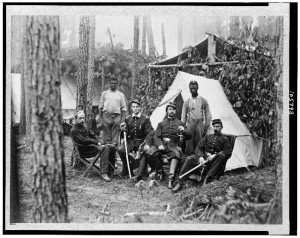The GROWLER takes issue with the practice of Union officers increasing their pay by claiming army privates as servants (wink-wink).
From The New-York Times February 9, 1862:
The Pay and Overpay of Army Officers.
To the Editor of the New-York Times:
My attention has been attracted by some articles recently published in your paper, in regard to what is termed an abuse that is sanctioned by general custom in our army, whereby officers draw more day than they are legally entitled to, through the allowances made them for servants.
The writers have very justly denounced the custom as dishonest, but to me it seems to be deserving of a more expressive term, as it is nothing less than theft, committed through the aid of perjury, and at the same time imposing degrading services on our volunteers, which is no part of a soldier’s duty.
In examining officers’ accounts, the Investigating Committee would find an extensive field for their work, and develop facts that would prove the necessity of some supervision in this department, whereby those who hear [bear] the burden of the war would be materially relieved in their taxes, and perhaps our soldiers be exempted from performing the duties of servants, which an unwarranted custom sanctions.
I have conversed with officers on the subject, and they have candidly acknowledged they had no right to the monthly sums they drew, but if the Government paid it to them, they were willing to take it, and justify themselves for the perjury in certifying that they employed a servant and did not employ any private soldier as such, when the reverse was the fact, by saying it was customary, and was winked at.
There are officers to my knowledge who employ from one to two soldiers as servants, and then certify on their pay-roll that they do not do it, and draw the pay, $24 50. for each servant allowed.
As this allowance for a servant is not, according to the regulations, to be paid, if a soldier acts as such, it is high time that those honored with commands to defend our Government, should prove their patriotism by imitating the example of the Lieutenant-Colonel spoken of in to-day’s TIMES*, of whom Secretary CAMERON said, he was the first man who refused to receive more than was due him. GROWLER.
WASHINGTON, Wednesday, Feb. 5, 1862.
*From The New-York Times February 5, 1862.

